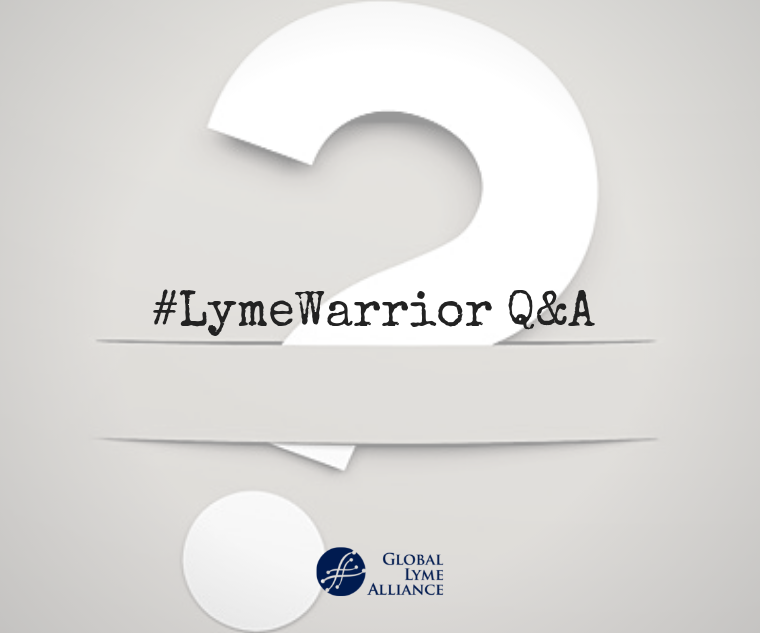
by Jennifer Crystal
Every few months, Jennifer Crystal devotes a column to answering your questions. Do you have a question for Jennifer? If so, email her at lymewarriorjennifercrystal@gmail.com.
Do you usually feel a tick bite? Does it itch?
Ticks are sneaky little creatures. You don’t feel them bite, because they inject an anesthetic when they do. Less than 50% of Lyme patients recall a tick bite or rash. This is also because ticks tend to bite in hard-to-spot places such as the scalp, the groin, the armpits, the belly button, and behind the ears. The bite site or rash can itch, but doesn’t always. And while a bull’s-eye rash is a tell-tale sign of Lyme disease, not all Lyme rashes, known as erythema migrans or EM, present as such. They can be spotty or blotchy, appearing any time from immediately after a bite to months or years later, in different parts of the body. My own rash was a series of red dots on my forearm. They weren’t raised, and didn’t itch. I didn’t give them much pause; neither did the nurse at the summer camp where I was working. Years later, after I was already bedridden with multiple symptoms, bull’s-eye rashes appeared on both of my elbows.
The bottom line is, if you have any kind of rash, it’s best to get it checked out by a Lyme Literate Medical Doctor (LLMD), but you also should not look to a rash as the only indicator of Lyme disease. Instead you should be on the lookout for flu-like symptoms like fatigue, muscle and joint aches, fever, and headache. It is always better to be safe than sorry with Lyme. See an LLMD, and take antibiotics if you suspect Lyme, even if you end up doing so prophylactically.
When you were bedridden, were you sleeping a lot?
You would think the answer to this question would be yes, and I wish it was. That is to say, I was exhausted, and certainly needed the sleep. I could barely muster the strength to walk to the mailbox, or up a flight of stairs. I was too tired to concentrate on books or TV. It felt like the worst case of the flu I ever had, and all I wanted to do was sleep.
But I couldn’t. This was one of the most frustrating parts of battling Lyme, babesia, and ehrlichia; my body could not get the rest it so desperately needed. Sure, I got physical rest from lying in bed, and occasionally, when I got lucky, I nodded off for a bit. However, most days—and nights—my brain would not shut off. I would lie awake praying for sleep, trying every calming exercise possible: meditating, listening to relaxing music, counting sheep. When I did sleep, I had hallucinogenic nightmares that left me even more tired.
I finally saw a sleep doctor who did both neurofeedback and cognitive behavioral therapy. I was able to sleep better at night—though my crazy dreams never fully went away—and was able to nap in the afternoons. Once I started getting adequate rest, my body was able to heal.
What is the best treatment for migraines?
I talked about dealing with headaches stemming from tick-borne illness in my post “Not All Headaches are Alike: What’s Causing Yours?”. Migraines can result not just from Lyme but from other tick-borne illnesses such as babesia or bartonella. Babesia is a parasite that drains oxygen from the red blood cells. This symptom called, “air hunger” can cause excruciating headaches; I used to get migraines several times a week. Over-the-counter painkillers did nothing for them. Prescription migraine medication helped in the short-term, as did rest. It helped to stay away from screens when I felt a migraine coming on.
But my migraines didn’t really ameliorate or disappear until I adequately treated the infections that were causing them. For me, this meant years of antibiotic treatment for Lyme disease and months of anti-malarial treatment for babesia, but everyone’s protocol is different. Now I only get a migraine once in a blue moon, usually when I’ve pushed myself too hard physically or neurologically. Then I know it’s time to slow down and get some sleep.
Related posts:
Living with Lyme Brain
To Sleep, Perchance to Dream
What is Air Hunger, Anyway?
Not All Headaches Are Alike: What’s Causing Yours?

Opinions expressed by contributors are their own.
Jennifer Crystal is a writer and educator in Boston. Her memoir about her medical journey is forthcoming. Contact her at lymewarriorjennifercrystal@gmail.com.

Jennifer Crystal
Writer
Opinions expressed by contributors are their own. Jennifer Crystal is a writer and educator in Boston. Her work has appeared in local and national publications including Harvard Health Publishing and The Boston Globe. As a GLA columnist for over six years, her work on GLA.org has received mention in publications such as The New Yorker, weatherchannel.com, CQ Researcher, and ProHealth.com. Jennifer is a patient advocate who has dealt with chronic illness, including Lyme and other tick-borne infections. Her memoir, One Tick Stopped the Clock, was published by Legacy Book Press in 2024. Ten percent of proceeds from the book will go to Global Lyme Alliance. Contact her via email below.
